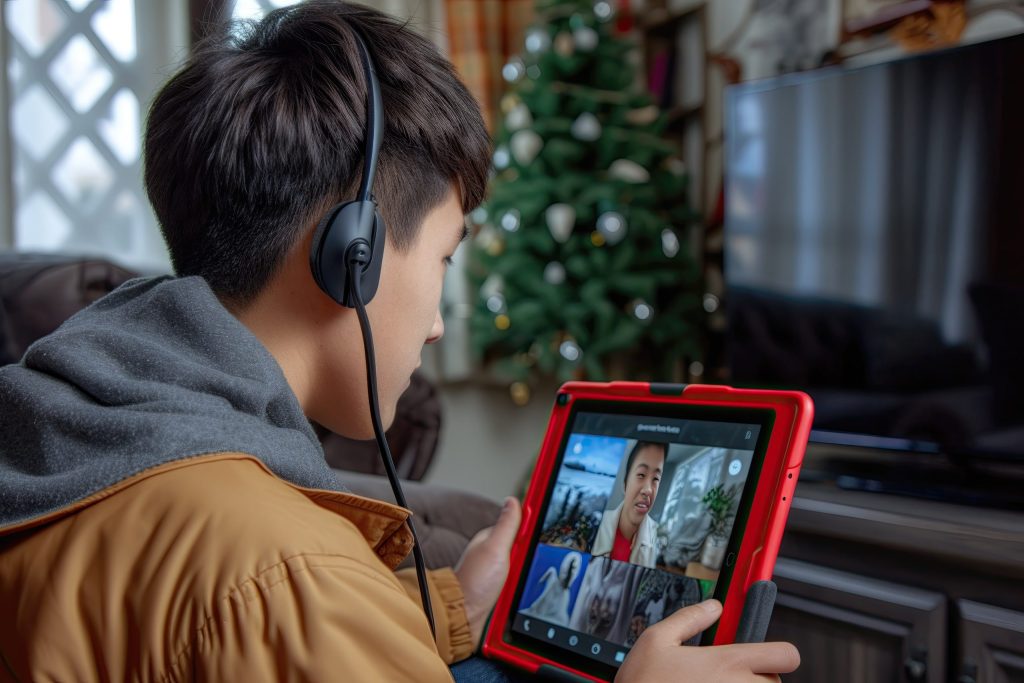The line between passion and problem
The glow of the screen, the rapid clicking of a controller, the intense focus on a digital world—for many parents, this is a familiar scene.
Teen gaming is more than a pastime; it’s a primary way many adolescents connect with friends and unwind. In fact, according to a 2023 Pew Research survey, 85% of US teens report playing video games, and 41% of them do so daily.
But as the hours online mount, a familiar worry can creep in: is this a healthy hobby or a harmful escape from reality?
You might be wondering, are video games bad for you?
The answer isn’t a simple yes or no.
For many teens, gaming is a positive outlet for creativity and social connection. But when the digital world becomes the only place your teen feels successful, happy, or in control, it may be a sign that gaming is a coping mechanism for a deeper struggle.

Video games and mental health: A complex relationship
The connection between video games and mental health is complex. While games can provide a sense of community and accomplishment, the line between engagement and unhealthy escape is often thin.
One big concern is how video games affect the brain negatively when used in excess.
The reward systems in many games, designed to deliver constant dopamine hits, can make real-world activities seem dull by comparison.
This can lead to a cycle where a teen turns to gaming to feel good, neglecting other areas of their life, which in turn makes them feel worse and drives them back to the game.
Many parents ask, can video games cause anxiety?
While video games don’t typically cause anxiety disorders, the high-pressure, competitive nature of some can certainly increase stress. More often, however, teens struggling with pre-existing anxiety or depression use gaming to self-medicate, which brings us to the core issue.

Recognizing the signs: When gaming becomes a problem
How can you tell if your teen’s gaming is a healthy hobby or a sign of a deeper problem?
The key is not the number of hours they play but the function gaming serves in their life.
Here are some signs that a teen may be using gaming as an escape:
- Neglecting responsibilities: A significant drop in grades, skipping chores, or forgetting other important obligations in favor of gaming.
- Loss of interest in other activities: They no longer seem to enjoy hobbies, sports, or spending time with friends in person.
- Gaming to avoid negative moods: They immediately turn to a game after an argument or whenever they feel sad or anxious. A pattern of using the digital world to numb difficult emotions may signal a link between depression and video games.
- Irritability and anger when not playing: They may become intensely angry, anxious, or moody if they’re unable to play.
- Deception about gaming: Lying about how much time they spend playing or hiding their gaming from you.
- Social isolation: Despite having online friends, they are increasingly withdrawing from face-to-face interactions with family and peers.
For some teens, especially those with ADHD, the rapid rewards and constant stimulation of gaming can feel particularly compelling.
So, do video games help with ADHD? While these aspects may help a teen focus on a game, it can make it even harder for them to focus on less stimulating real-world tasks.

How to help your teen find a healthy balance
Addressing problematic gaming doesn’t mean banning screens. But you should help your teen reconnect with the real world and develop healthier coping skills.
- Lead with curiosity, not accusation: Instead of saying, “You’re playing too much,” try to understand their world. Ask them about the game they’re playing, who they play with, and what they enjoy about it. This shows you respect their interests and opens the door to a real conversation.
- Talk about the why: Gently explore the feelings behind the gaming. “I’ve noticed you seem to play a lot when you’re feeling stressed. Is that something you’ve noticed too?” This can help them start to connect their gaming habits to their emotional state.
- Collaborate on boundaries: Work with your teen to set reasonable limits around gaming. This could include “no-phone” zones at dinner, a screen-time cutoff at night, and ensuring homework and chores are done first. When they are part of the process, they are more likely to buy in.
- Encourage offline interests: Help your teen rediscover the joy of activities that aren’t on a screen. This might mean signing up for a class, going for a hike, or simply shooting hoops in the driveway. The goal is to remind them that fulfillment exists offline.

When an escape becomes a cry for help
If you’ve tried to set boundaries and have conversations, but your teen’s reliance on gaming is only getting worse—or if it’s clear they are using it to cope with severe depression, anxiety, or trauma—it’s time to seek professional support.
Like vaping or substance use, problematic gaming can be a symptom of a deeper issue. Teens may be using it as a maladaptive coping strategy.
At Avery’s House, we understand that a teen’s digital escape is often a sign of real-world pain.
Our compassionate therapists help teens address the underlying mental health challenges that fuel problematic gaming. We provide a safe space for them to develop healthier coping strategies and build the confidence they need to thrive in all aspects of their lives.
Your teen’s passion for gaming doesn’t have to be a source of conflict.
With balance and the right support, they can enjoy their digital hobbies while staying connected and engaged with the world around them.
Contact Avery’s House today to learn more about how we can help your family find this healthy balance.